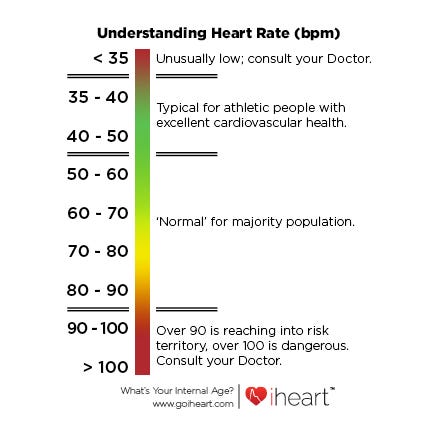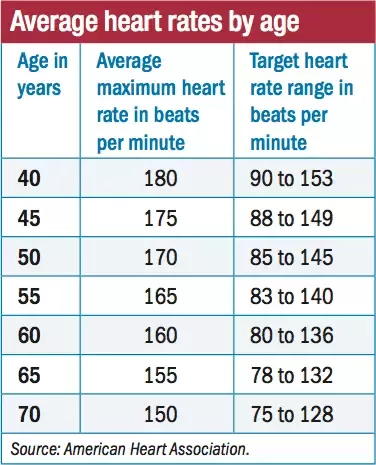101136heartjnl-2017-312731 No abstract available. What Is The Normal Pulse Rate For Adults.
 Normal Resting Heart Rate Healthbodywise
Normal Resting Heart Rate Healthbodywise
Highly trained athletes may.

Average resting pulse rate. The normal resting heart rate for adults over the age of 10 years including older adults is between 60 and 100 beats per minute bpm. A normal resting heart rate range is between 60 and 100 bpm. Above 90 is considered high.
If the resting pulse rate is constantly at 100 beats per minute a doctor needs to be consulted as soon as possible. A low resting heart rate is also a. The normal range for a resting heart rate is between 60 bpm and 100 bpm.
Your resting heart rate is the heart pumping the lowest amount of blood you need because youre not exercising. Well-conditioned athletes however could have a resting heart rate of around 40 bpm. For example an athlete might have a resting heart rate of around 40 beats a minute.
Many factors influence your resting heart rate. Essentially the lower the resting heart rate is the more efficient your heart functions. Resting heart rate RHR -- the number of times your heart beats per minute at rest -- is a quick way to gauge how efficiently your heart is working.
What are normal levels and when should I worry. The lower the heart rate is at rest the more efficient the heart function is. The normal RHR range for adults is between 60 and 100 beats per minute.
This is usually their resting pulse rate. Whats a normal resting heart rate. A normal resting heart rate for adults ranges from 60 to 100 beats per minute.
A resting heart rate outside of the normal resting heart rate range combined with symptoms like shortness of breath dizziness and fatigue may indicate a heart problem. Tachycardia is a high heart rate defined as above 100 bpm at rest. A normal resting heart rate is between 60 to 100 beats per minute.
Cardiac risk factors and. Usually a lower resting heart rate means your heart is working more efficiently and is more fit. Checking your pulse can also tell you if your heart beat is regular or irregular.
91 Zeilen A normal adult resting pulse will vary between 60 and 100 beats per minute. To measure your heart rate simply check your pulse. What Is a Normal Resting Heart Rate.
An athlete or more active person may have a resting heart rate as low as 40 beats per minute. For adults a normal resting heart rate ranges between 60 and 100 beats a minute. Normal SpO2 is usually at least 95.
If youre sitting or lying and youre calm relaxed and arent ill your heart rate is normally between 60 beats per minute and 100 beats per minute. It also translates into better cardiovascular fitness. Bradycardia is a low heart rate defined as below 60 bpm at rest.
Generally a lower heart rate at rest implies more efficient heart function and better cardiovascular fitness. Genes play a role. The following table shows the approximate target heart rates for various age groupsFind the age group closest to your age and find your target heart rate.
A normal resting heart rate should be 60100 beats per minute but it can vary from minute to minute. For instance an athlete can have a resting heart rate of as low as 40 beats per minute. What is a normal resting heart rate.
The following resting heart rate chart will give you a better idea about the heart rate of. For most of us between 60 and 100 beats per minute bpm is normal1 The rate can be affected by factors like stress anxiety hormones medication and how physically active you are. It can go up to 130150 beats or higher per minute when youre exercising thats normal because the body needs to pump more oxygen-rich blood around the body.
During sleep a slow heartbeat with rates around 4050 bpm is common and is considered normal. A healthy resting heart rate is about 60 beats per minute but this number varies with age. For example a well-trained athlete might have a normal resting heart rate closer to 40 beats per minute.
Epub 2018 Jan 30. The usual range for resting heart rate is anywhere between 60 and 90 beats per minute. Some patients with chronic lung disease or sleep apnea can have normal levels of around 90.
The guidelines for moderately intense activities is about 50-69 of your maximum heart rate and hard physical activity is about 70 to less than 90 of the maximum heart rate. Their pulse rate can go as high as 100 if the individual is using certain medications has a fever anemia etc. However whats normal for you might be abnormal for someone else.
The resting heart rate of a normal adult is between 60 and 100 beats per minute. The American Heart Association states the normal resting adult human heart rate is 60100 bpm. For adults the normal pulse rate is considered to be around 60 beats per minute.
Besides a normal heart rate chart when resting therere also normal ranges for heart rate during exercising.

